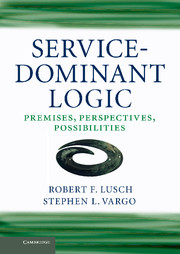Book contents
- Frontmatter
- Dedication
- Contents
- List of Exhibits
- Foreword
- Preface
- Acknowledgments
- Part I Premises
- Part II Perspectives
- 5 It’s all actor-to-actor (A2A)
- 6 The nature, scope, and integration of resources
- 7 Collaboration
- 8 Service ecosystems
- Part III Possibilities
- Appendix Reflection and dialogue
- Index
- References
7 - Collaboration
Published online by Cambridge University Press: 05 June 2014
- Frontmatter
- Dedication
- Contents
- List of Exhibits
- Foreword
- Preface
- Acknowledgments
- Part I Premises
- Part II Perspectives
- 5 It’s all actor-to-actor (A2A)
- 6 The nature, scope, and integration of resources
- 7 Collaboration
- 8 Service ecosystems
- Part III Possibilities
- Appendix Reflection and dialogue
- Index
- References
Summary
I’m a great believer that any tool that enhances communication has profound effects in terms of how people can learn from each other, and how they can achieve the kind of freedoms that they’re interested in.
Bill GatesIntroduction
The mantra that emerged in the 1950s about firms needing to be customer oriented and the mantra of the past two decades about firms needing to be society oriented are often viewed as signs of the enlightenment of senior executives and managers. They could also be viewed as signs that the traditional model of the firm, or goods-dominant (G-D) logic, was broken and in need of patching and repairing to make it at least resemble a workable model. Think for a moment: to assert that firms need to be customer oriented acknowledges that the customer is something separate and different and requiring special orientation. Similarly, having a special office or senior “C- level” officer of corporate social responsibility acknowledges that the organization is not so oriented. In brief, the customer and society are seen as exogenous or “out there,” and the firm needs to reorient toward them. However, in the context of G-D logic, the underlying rationale for this orientation is that the firm can push product and agenda to actors. This push model is based on designing production and distribution systems to be as efficient as possible through standardized processes to supposedly deliver value to customers in containerized packages of multi-attribute bundles of tangible and intangible elements characterized as products. Predictably, with this push model, the firm must use heavy doses of advertising and promotion to convince customers and other stakeholders that its agenda is in their best interests.
Information
- Type
- Chapter
- Information
- Service-Dominant LogicPremises, Perspectives, Possibilities, pp. 136 - 157Publisher: Cambridge University PressPrint publication year: 2014
